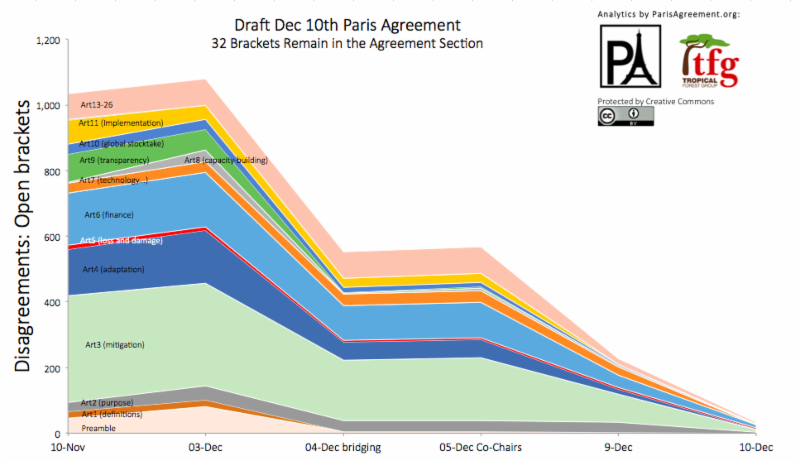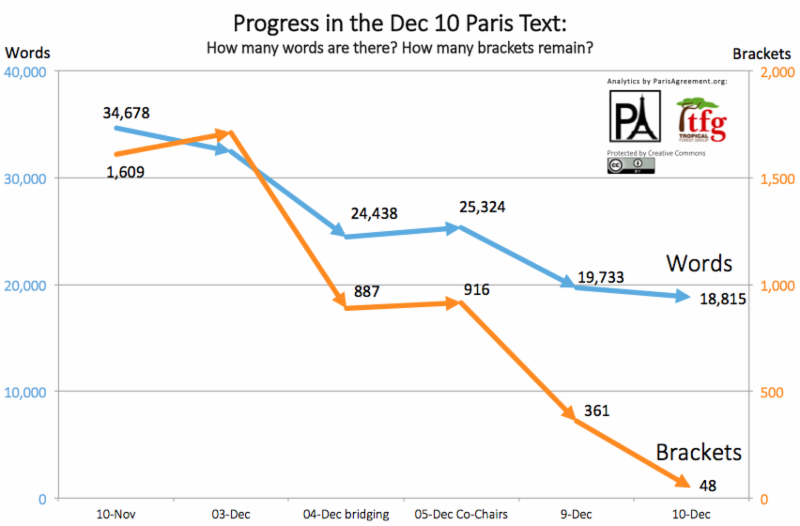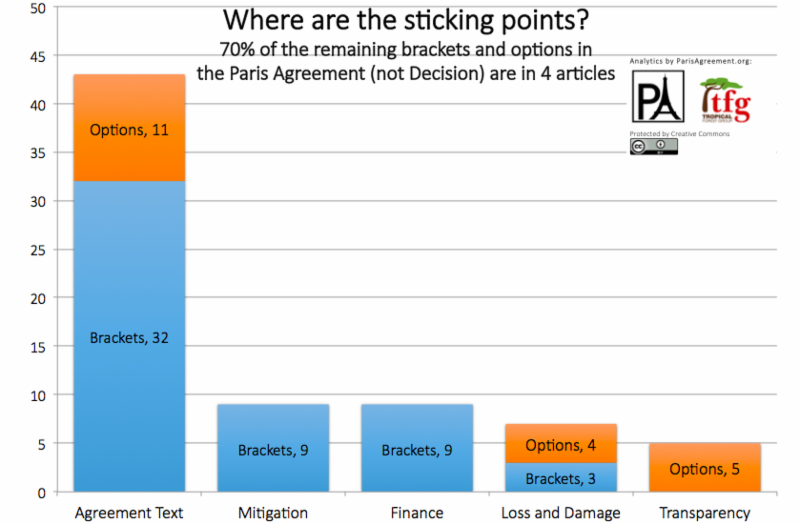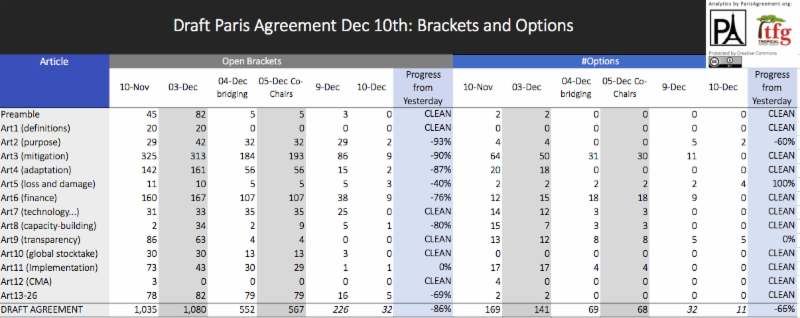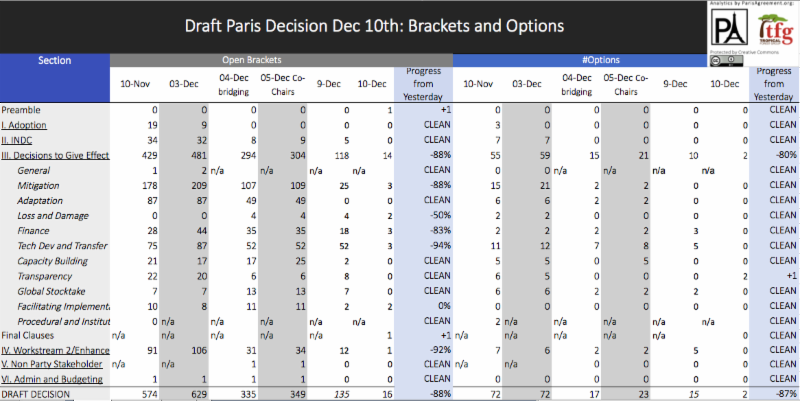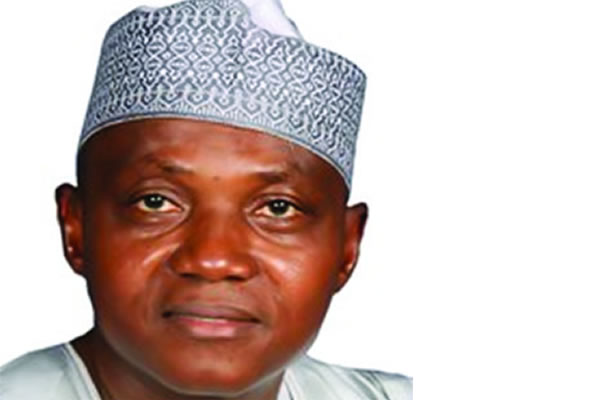Infographic: Analytics of second draft Paris outcome
Allianz, ABP join in aligning portfolios with low-carbon economy
Allianz and ABP, two of the world’s biggest institutional investors, on Monday in Paris, France at the UN Climate Change Conference (COP21) joined the Portfolio Decarbonisation Coalition (PDC), a group of investors committed to supporting the fight against climate change.
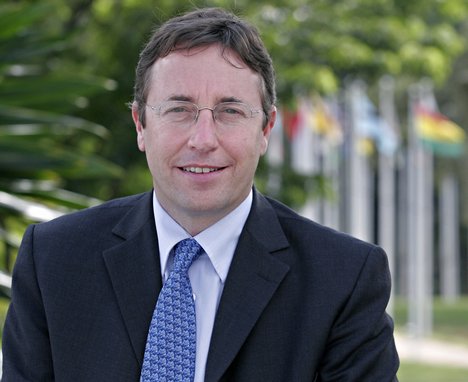
With Allianz and ABP, the PDC now convenes 25 investors overseeing the gradual decarbonisation of a total of $600 billion in Assets under Management (AUM), dramatically surpassing the PDC’s target of $100 billion.
By joining the coalition, the two organisations are sending a strong signal to world governments gathered in Paris to negotiate a new global treaty on climate change.
“The success of the PDC is a clear signal that leading investors are recognizing the inherent risk that climate change poses to their portfolios,” said Achim Steiner, Executive Director of the United Nations Environment Programme (UNEP) and UN Under-Secretary-General. “By aligning their portfolios with the low-carbon economy, they are playing a key role in the climate action the world wants to see.”
Portfolio decarbonisation means investors systemically integrate carbon information into portfolio design, signalling that climate change, and the corporate response to it, is critical to shareholder value and investor interests going forward.
“Climate change requires fast and collective action and continued commitment for decades to come. Our knowledge of risk, our financial resilience and long-term investment horizons enable us to offer effective support for climate protection while making the most out of long-term opportunities for our clients,” said Oliver Bäte, Chief Executive Officer of Allianz SE. “Delaying action will be costly and will damage growth prospects.”
Mr. Bäte called on his industry and long-term investors to join in on climate actions and to support clients and governments in their low-carbon transition.
“More and more companies and states will incorporate climate change considerations – they are going to address physical climate risks, they want to reduce emissions and they have to reflect regulatory needs and developments,” he said. “We will anticipate these risks and opportunities in our investment and insurance portfolios.”
Allianz’s climate and decarbonisation actions will include the phasing out of coal investments, the use of environmental, social and governance scoring in investment decisions across its portfolio of own investments, and scaling up its investments in renewable energy.
Allianz is one of the leading private investors in renewable energy, with more than EUR 2.5 billion committed and plans to at least double these investments.
“We and all signatories of the PDC need an ambitious and reliable regulatory environment now to live up to our commitment to scaling back our financing of carbon-intensive businesses, and investing in renewables and low-carbon infrastructure. If this is fulfilled, then climate protection will not fail because of a lack of funding,” Mr. Bäte said.
Co-founded by the United Nations Environment Programme Finance Initiative (UNEP FI), the fourth National pension fund of Sweden, AP4, Europe’s largest asset manager Amundi and CDP, the international not-for-profit organisation holding the largest global collection of corporate environmental data, the PDC was launched at UN Secretary-General Ban Ki-moon’s Climate Summit in September 2014.
Corien Wortmann-Kool, Chair of the Board of Trustees, ABP: “By providing our investment managers with carbon budgets alongside the return objectives and risk budgets, we want to achieve the dual objective of good investment returns and continuous reductions in our carbon footprint.”
Paul Dickinson, Executive Chairman CDP: “We have reached a tipping point in the way investors view the impacts of climate change, which is borne out by the momentum of the PDC. The role of investors will become ever more critical as discussions progress at COP21 towards a binding deal. With growing demand for CDP’s raft of investor tools including our latest sector research for investors, we are seeing major investors appreciating the impact of environmental factors on the bottom line. They need reliable environmental data and tools to assess financial risks and opportunities which we must provide.”
Cautious optimism greets new draft climate agreement
A new streamlined draft agreement for a comprehensive climate deal was on Wednesday (December 9, 2015) afternoon released in Paris, with the French presidency urging for the finalisation of the deal on Thursday.

The newest version of draft Paris Agreement appears to show progress from 1,609 open brackets and 228 Options in the pre-COP November 10th draft text to currently 366 open brackets and 47 options.
The development looks to have raised some level of hope that something positive will eventually emerge from Paris. Nonetheless, skeptisim is rife over the emergence of a global legally binding climate agreement, as delegates analyse and offer comments on the what is increasingly looking like an historic summit.
Patrick Cage, Coordinator of the ParisAgreement.org Media Platform, says: “Our analytics demonstrate the progress being made towards a final universal Paris Agreement. Yesterday evening, countries’ support of the presidency to develop a new text revealed continued political will and signaled positive momentum in crafting what may become the largest environmental agreement of our lifetimes. If countries maintain the same spirit of cooperation and flexibility, then we expect to leave Paris with a foundation for coordinated and effective global action on climate change.”
Catherine Martini, Assistant Team Manager of the ParisAgreement.org Media Platform: “The new text out is remarkably clean. It saw 79% reduction in brackets, an 18% reduction in options, and a 57% reduction in words from the pre-COP text. Last night in the Comite de Paris, the process was adopted swiftly by all countries that led to this new text today. This shows an unprecendented trust in the COP presidency, and that we have a well-oiled machine working here at COP21.”
In a reaction, delegates called on countries to choose the strongest possible options in the final hours of the Paris Climate Summit in order to better protect vulnerable communities and speed up the transition to renewable energy.
Mohamed Adow, Senior Climate Advisor, Christian Aid: “The next 24 hours are critical. This is where the real negotiations will begin. We really need countries to fight to keep in the high ambition options on climate finance, the long term decarbonisation goal and a ratchet mechanism to ensure the agreement evolves to meet the needs of a changing world.”
May Boeve, Executive Director, 350.org: “We’re asking for a clear signal out of Paris, but some parties are still muddying the waters with weak text. If countries are serious about keeping warming below 1.5°C, we need to see a firm commitment get off fossil fuels and move to 100% renewable energy by 2050, and an ambition mechanism to help us get there. Politicians need to start living up to the title of ‘leader’ in the next 48 hours.”
Michael Brune, Executive Director, Sierra Club: “The updated climate text today marks a key moment for the Paris agreement. Political leaders will make final choices in the coming hours about how we take global action to fight the climate crisis. Sierra Club urges ambitious and just action to leave a safer home for our children and protect the world’s most vulnerable nations.”
Kaisa Kosonen, Climate Policy Advisor, Greenpeace: “Some of the words in this text are smeared with the fingerprints of the oil-producing states. It’s a mix of the good, the bad and the ugly, but we’ve got three days to force the worst stuff out and get a decent deal. It’s crunch-time now, it’s going be hard, but there’s a lot still to fight for. It’s good that a temperature goal of 1.5 degrees C is still there.
“It’s bad that countries’ emissions targets are so weak and there’s very little in the text that makes them come back soon with something better. But worst is the deadline for phasing out carbon emissions. Right now this draft deal contains wishy-washy language instead of setting a tight deadline of 2050. Without a date it won’t have weight.
“This shouldn’t be such hard work. Renewables are already displacing polluting energy systems across the world, contributing hugely to a possible peaking of global emissions. There’s a disconnect between what’s happening in this conference hall and what’s happening in the real world. The negotiators now have three days to raise the bar. If they can commit to a 1.5-degree goal, they should be able to set a fossil fuel phase-out date of 2050, as that’s the only way to get there. And they should agree that countries will come back soon with more ambitious emissions targets that are regularly strengthened. Ideally this deal would commit us to 100% renewables, protect Indigenous Peoples, guarantee funding for poorer countries to develop without loading the atmosphere with carbon, and compensate people on the frontlines of climate change for loss and damage.”
Alden Meyer, Director of Policy and Strategy, Union of Concerned Scientists: “It’s encouraging to see a cleaner text that contains fewer brackets as a result of agreements being reached on issues like technology development and transfer and capacity building. However, the agreements on the core political issues—the long-term goal, review and revision of INDCs, transparency, loss and damage, and finance—have yet to be resolved. We’re now at the critical point of the negotiations. Over the next day or two, ministers need to rise above their differences to create a final agreement that rapidly transitions the world to a clean energy economy and allows us to avoid the worst impacts of climate change.”
Sven Harmeling, Climate Change Advocacy Coordinator, CARE International: “All the elements for a meaningful deal are on the table, but now the fight begins on trade-offs. It’s encouraging to see ‘loss and damage’ recognised in the draft text, but its place is not yet secured. The means to deliver solutions for climate impacts are also falling short from what is needed. This is a question of survival for the world’s poorest and most vulnerable people and communities.”
Adriano Campolina, Chief Executive, ActionAid International: “The draft agreement continues to leave developing nations hanging. There are just two days to reach a deal that is fair and just for the world’s poorest. With what’s currently on the table, rich nations are still holding the purse strings, unwilling to commit to their fair share of action to save the people and their planet.”
Helen Szoke, Executive Director, Oxfam: “There is still a long way to go: this is crunch time. The chance to set new funding targets from when the Paris deal comes into force in 2020 is still very much on the table and needs to stay there if developing countries are to have any hope of more support in the years ahead. Adaptation hangs on a thread but there is recognition of the need for grants and innovative sourcing to help meet climate funding needs. Despite women being most affected by climate change, any reference to gender equality has been dropped.”
Duncan Marsh, Director of International Climate Policy, The Nature Conservancy: “On Wednesday evening in Paris, negotiators have succeeded in boiling down remaining issues to those that can only be decided by their political leaders. Of course, these are the ones that have divided countries for years, so resolving them will still not be easy. It is essential that compromise be found that establishes a strong but flexible system of strong transparency and accountability for all countries, and affirms the important role that lands, oceans and other ecosystems can play in minimising and protecting against climate risks.”
Alex Doukas, Senior Campaigner, Oil Change International: “Big fossil fuel interests have infiltrated the new text in a number of ways. For example, by weakening text that would have ensured that scarce international public money goes to solving the problem, and not fueling it. Countries will have to push back to make sure that big polluters don’t leave their dirty fingerprints all over this deal. Regardless of the ultimate outcome, the end of the fossil fuel era is inevitable. World leaders have a chance to catch up to a growing movement here in Paris, but they will have to spend the next two days working on behalf of people, not polluters.”
Paul Cook, Advocacy Director, Tearfund: “A climate deal which works for the poorest people on the planet is still within reach, but in the next few hours countries need to do a lot of work to back the right options. Parties need to back 1.5 degrees, 5 year ratchets to strengthen planned emissions cuts and significantly scaling up from $100 billion of climate finance for developing nations to make this a good deal for the world’s most vulnerable.”
Germana Canzi, senior international analyst at the Energy and Climate Intelligence Unit (ECIU): “The French Presidency has done a very good job in moving negotiations forwards and ensuring there is positive momentum towards a deal after the ambition generated by global leaders last week. Ministers have clearly made huge progress in the last few days, but there are still issues to be resolved, including on the long-term goal that is ultimately needed to solve climate change.
“Many countries have come into negotiations recognising that a clean energy transition and a decoupling of emissions from economic growth are underway already, but Paris could be a key accelerator towards the end of the fossil fuel age.”
Mindy Lubber, president of Ceres and director of the Investor Network on Climate Risk, a US-based network of 115 investors collectively managing $13 trillion: “The global business community has been looking for a catalytic signal from Paris and, judging from today’s text, it appears we’re close to getting it. It’s encouraging to see it includes clear and specific long-term emission goals, coupled with concrete ambition mechanisms beginning around 2020. It gives me hope that a clear market signal can be achieved that will unleash trillions of dollars — not just billions — in an accelerated clean energy transition worldwide.”
Philippe Joubert, Chair of the Prince of Wales’s Corporate Leaders Group, which brings together 23 European companies employing 2 million people in 170 countries, with combined revenues of $170 billion: “We expect world leaders to demonstrate their leadership in finalising the agreement required and we urge them to listen to the voice of business. We need a clear vision of the world we’re shaping for tomorrow, a direction of travel. This means a specific long-term zero emissions goal well before the end of the century. The impetus from a strong Paris outcome will enable us to speed up and scale up our solutions.”
Photos: Environment Minister, Amina Mohammed, at COP21
Nigeria’s new Environment Minister, Mrs Amina Mohammed, is leading the country’s delegation at the ongoing 21st Session of the Conference of the Parties (COP21) to the United Nations Framework Convention on Climate Change (UNFCCC) in Paris, France.
A former Special Advisor on Sustainable Development to UN Secretary General Ban Ki-moon, Mrs Mohammed appears to be doing a pretty good job coordinating the nation’s activities at the global summit, where delegates – and the entire world – are looking forward to a favourable outcome that will address the worrisome climate issue.
Apart from being actively involved in the current negotiations involving ministers, she made a presentation on Tuesday (December 8, 2015) at the High Level Segment of the COP. She has also attended numerous meetings, side events and sessions where, for example, Nigeria committed to reducing SLCP emissions in the Oil and Gas sector as well as join the Initiative on Zero Routine Flaring by 2030.
Consequently, commendations have begun to come her way.
Nigeria’s former climate chief, Dr Victor Fodeke, submitted: “A new dawn has set in for the country. We have now in Nigeria what looks like the most acclaimed Minister of Environment leading the continent in the climate change and sustainable development process. During our just concluded morning meeting of African Group of Negotiators some hours ago, our Honourable Minister of Environment, leading the WORKSTREAM 2 in the COP21 negotiation process, was given a very loud ovation as the best in Africa for Africa.
“You will be proud to raise your head as a Nigerian henceforth, because a dynamic team of Climate change THINKTANK are in place and offering technical support, coordinated by the leadership of the Department of Climate Change in the Federal Ministry of Environment.. Nigeria the sleeping giant is now wide awake. We covet your prayers. Long Live Nigeria, Long Live Africa.”
EnviroNews presents a couple of visuals of the minister at work in Paris.
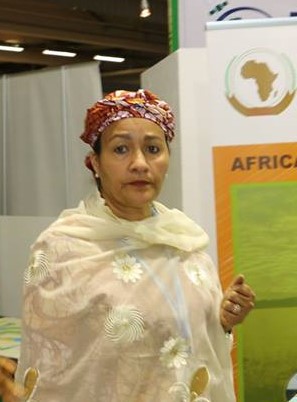
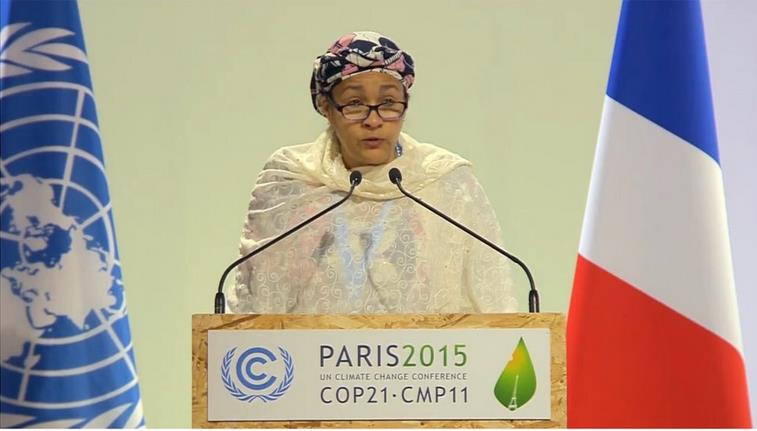
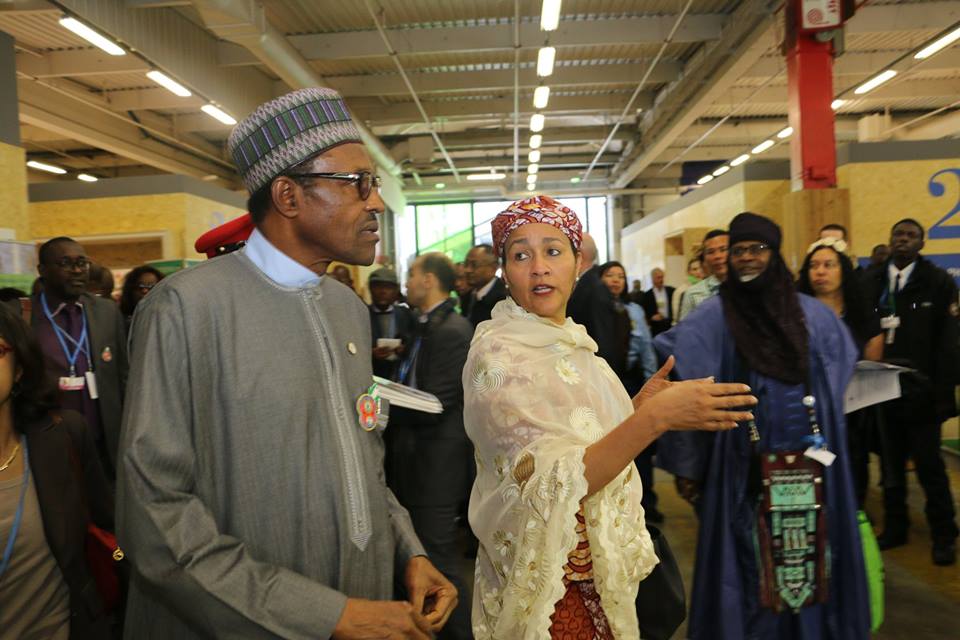
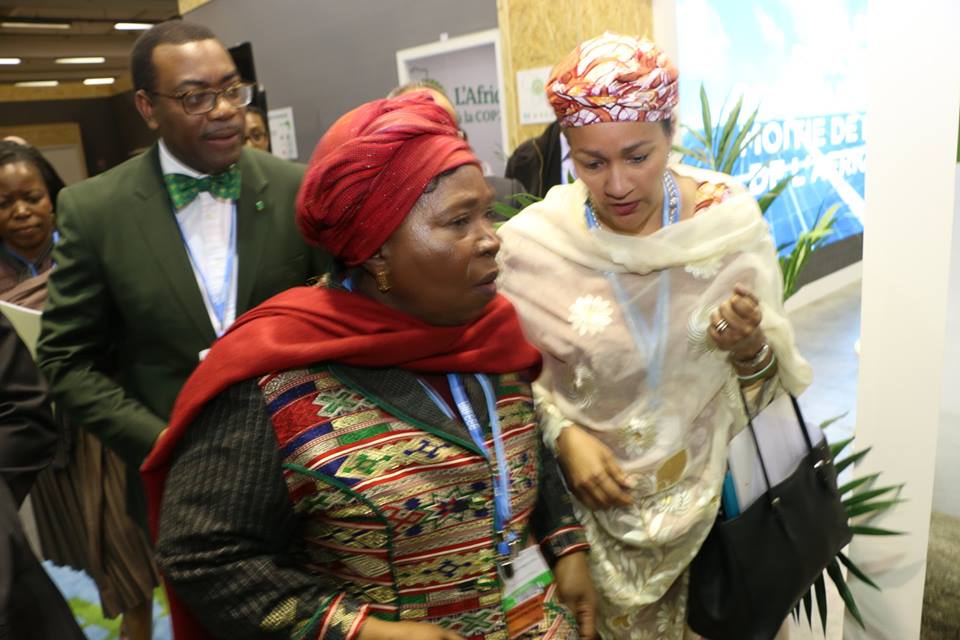
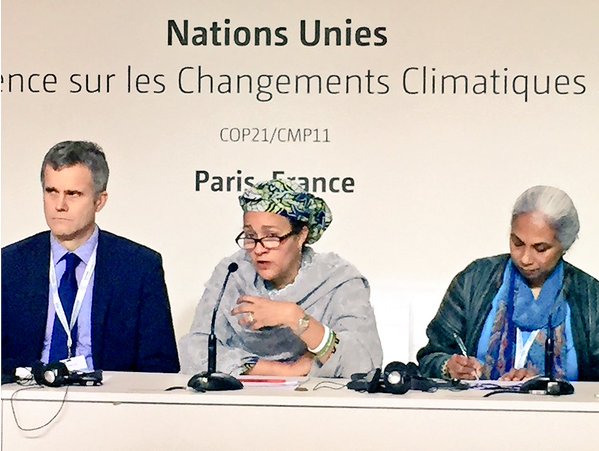
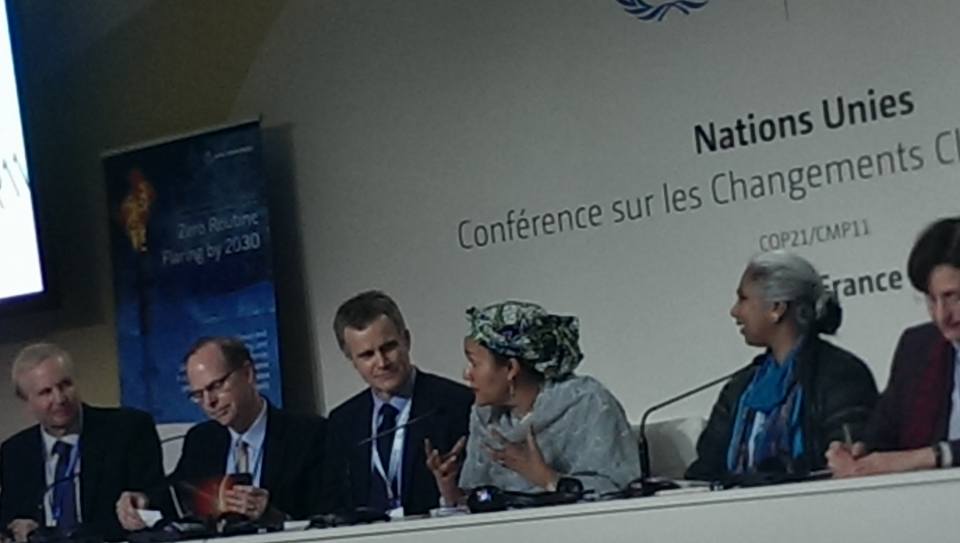
How I will transform road, housing, power sectors, by Fashola
The Minister of Power, Works and Housing, Babatunde Raji Fashola (SAN), on Tuesday (December 8, 2015) in Abuja unveiled his short term plans to address housing deficits, provide good roads and urgently increase power generation in the country with extra 2,000 megawatts.
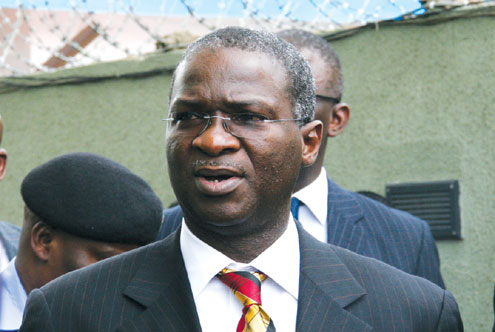
Fashola said during his maiden press briefing in the Federal Capital City (FCT) that the Lagos-Ibadan Expressway which has been under construction and the Second Niger Bridge are of great importance to the current administration. According to him, both controversial projects would thus get urgent attention.
Fashola, former Governor of Lagos State, disclosed that work would soon commence on all roads that link the 36 states of the federation, adding that major roads which had been suspended due to paucity of funds and are vital to boost social economic activities in the country would be quickly revisited.
He spoke on plans to partner with the private sector and fully privatise the power sector in order for the country to witness genuine development like the telecommunication.
Part of his plans is also to immediately restore the jobs of construction workers who were laid off by local and international construction companies in the country.
His words: “The records that have been made available from previous budgets show that the last time Nigeria budgeted over N200 billion in a year’s budget for roads was in 2002. It seems that as our income from oil prices increased over the last decade, our spending on roads decreased.
“As far as status reports go, the federal government budgeted N18.132 billion in 2015 and the Ministry of Works got N13 billion for all roads and highways in 2015, although it has contracts for 206 roads, covering over 6,000km with contract price of over N2 trillion.”
However, Fashola stated that government’s ability to achieve connectivity of Inter-state roads would largely depend on capital spending in the 2016 budget.
He said it became imperative to pay contractors and get them back to work as soon as possible.
“Our short term strategy will be to start with roads that have made some progress and can be quickly completed to facilitate connectivity. We will prioritise within this strategy by choosing first the roads that connect states together and from that grouping start with those that bear the heaviest traffic.
“As at May 2015, many contractors have stopped work because of payment, and many fathers and wives employed by them have been laid off as a result.
“Some of the numbers from only four companies that were sampled suggest that at least 5,150 workers have been laid off as at March 11, 2015; and if we realise that there are at least 200 contracts pending, on the basis of one company per contract,” he said.
Analysing the unfortunate situation, Fashola explained, “If each contractor has only 100 employees at each of the 200 contract sites, it means at least that 20,000 people who lost their jobs can return to work if the right budget is put in place and funded for contractors to get paid.
“The possibility to return those who have just lost their jobs back to work is the kind of change that we expect to see by this short term strategy.
“In order to make the roads safer, we intend to re-claim the full width and set back of all federal roads, representing 16% and about 36,000km of Nigeria’s road network by immediately now asking all those who are infringing on our highways, whether by parking, trading, or erection of any inappropriate structure to immediately remove, relocate or dismantle such things voluntarily. This will be the biggest contribution that citizens can offer our country as proof that we all want things to change for the better,” Fashola added.
Nigeria’s committed to ‘green’ economic transformation, says Mohammed
Nigeria’s Environment Minister, Mrs Amina J. Mohammed, on Tuesday (December 8, 2015) at a High Level Segment of the ongoing UN Climate Change Conference (COP21) in Paris said that the nation is committed to an economic transformation, which places inclusive green growth at its heart. Mohammed, who is head of the country’s delegation at the COP, emphasised that the transformation is reflected in the recently submitted Intended Nationally Determined Contribution (INDC)

The political momentum generated by the recent universal adoption of the 2030 Agenda on Sustainable Development by the United Nations General Assembly in New York provides the appropriate context for engagement at this Conference of Parties. The Paris outcome must result in a legally binding Agreement that ensures a sustainable future for our people and planet.
Nigeria is committed to an economic transformation, which places inclusive green growth at its heart. This transformation is reflected in my country’s ambitious INDC. We have announced our plans to reduce emissions by 20% below BAU by 2030, rising to 45% with the support of the international community. These are actions we can and are determined to take to support our common interest in addressing the global climate challenge. Our renewed urgency comes from recognition of the grave social, economic and environmental threats that climate change poses to our country. Climate change impacts are already threatening the livelihoods of our people. The devastating floods the country suffered in 2012 displaced more than 2.1 million Nigerians are a stark reminder of our vulnerability.
Furthermore, we are acutely aware of how climate variability can aggravate social unrest and provide a breeding ground for conflict and mass migration. For example, Lake Chad in the North East of our country is today a mere 10% of its original size, having shrunk from 25,000 sq. km to barely 2,500 sq. km in 25 years and livelihoods have been lost thus exacerbating poverty.
Nigeria fully aligns itself with the principles of climate justice to achieve a human-centred approach towards safeguarding the rights of the most vulnerable and lifting the burdens and sharing the benefits of climate action. Women, children and youth must be integrated throughout this Agreement. Recognising women empowerment and rights will be key to success here in Paris. We must also recognise that sustainable transformations will be needed to protect human health and welfare for our populations.
Nigerians have high expectations of this Conference. Paris must give us an agreement that will equitably promote climate change mitigation, adaptation and resilience based on effective means of implementation through adequate financing, technology transfer and capacity development. Developed countries have a further responsibility of taking the lead in emission reductions, and also to fulfil obligations to provide finance, technology and capacity to developing countries in support of their own mitigation and adaptation obligations. It is our fervent hope that these implementation modalities will be explicitly enshrined in the Agreement.
But even though the current focus of INDCs is on the delivery of emissions reductions to 2030, we must not take our eyes off the longer-term goal – and the emissions pathway that this demands. Ultimately, there is a moral imperative to stabilise temperature increases at 1.5 degrees Celsius. The African Union Agenda 2063 shows how Africa is committed to contributing and delivering on this goal.
The onus is now on us, as political leaders, to seize this historic opportunity to deliver an ambitious Agreement. It is an opportunity that will define the physical and economic security of our children and their children. Nigeria has shown its willingness to be part of the solution.
I will end with a wise quote from Madiba that says “It always seems impossible until it is done”.
$100m scheme to foster clean energy investment in developing nations
A new multi-million-dollar initiative to promote clean energy investment in developing countries was on Monday (December 7, 2015) announced at the COP21 climate talks in Paris, France.

The Global Environment Facility (GEF) will provide $2 million in initial funding to help kick-start the formation of the “Climate Aggregation Platform” (CAP) in 2016. The CAP is expected to leverage over $100 million in co-financing from different partners, including from the Inter-American Development Bank (IDB).
The announcement was made by Naoko Ishii, GEF CEO and Chairperson, during Energy Day at COP21. The CAP aims to help build pipelines of standardised, low-carbon energy assets in developing countries and to develop low-cost sources of financing for these assets, tapping new and diverse investor bases.
The United Nations Development Programme (UNDP), together with the Climate Bonds Initiative (CBI), will implement the CAP programme. The IDB will be a core partner in demonstration transactions.
The CAP will be structured around three core activities:
- A global working group, to promote engagement and coordination amongst key finance and industry stakeholders.
- Promoting the standardisation essential to aggregation.
- In-country demonstrations and providing technical support for pilot transactions, to build pipelines and achieve scale.
Aggregation is important to allow developing country financial institutions, from banks to micro-finance lenders, to make the most of their limited balance sheets. The aggregation, or bundling together, of small loans and assets aims to create investment products that meet the large-scale needs of institutional investors including global pension funds and insurance funds. Effective financial aggregation holds out the promise of opening up new finance & investment channels, both domestic and between North and South.
The operational launch of the CAP will take place in Spring 2016 following further project planning and international stakeholder consultations.
Naoko Ishii, CEO GEF said: “We need to rapidly ratchet up financing support for clean energy in developing countries. I’m delighted to announce the launch of the Climate Aggregation Platform to help spur strategic and transformative investments and to accelerate energy efficiency.”
Helen Clark, Administrator UNDP, said: “Access to low-cost financing will be essential to the goal of bringing affordable, clean and reliable energy to the citizens of developing countries. I welcome the CAP and am hopeful that, in promoting financial aggregation, it can make a contribution to this important objective.”
Climate Bonds CEO Sean Kidney said: “The CAP is an initial step in addressing the myriad of structural, financial and economic barriers that currently hinder the rapid growth of small scale climate friendly projects. Bringing together the major stakeholders to progress the underlying issues around aggregation is a welcome development.”
US, EU seek a weakened Loss and Damage in Paris agreement
Ask vulnerable countries to explicitly give up the right to raise issues of compensation and liability in future
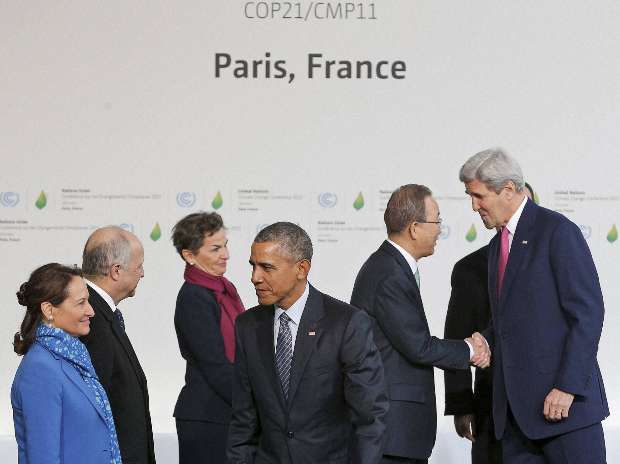
The US, EU and some other developed countries have demanded that poor and vulnerable countries commit at Paris that they shall never ask for compensation or hold rich nations liable for the inevitable loss and damage in coming years.
Business Standard accessed the proposal that the US put forth informally before other countries demanding that poor and vulnerable countries give up any future rights to demand compensation or create any form of legal liability upon developed countries.
The proposal reads, “The Parties recognise the importance of averting and minimizing loss and damage from climate change… The Parties commit to continued implementation of the Warsaw International Mechanism under the Convention, in accordance with decisions of the Conference of the Parties and on a cooperative basis that does not involve liability and compensation.”
The last phrase of the last sentence in this proposal sets the redline that US, EU and other developed countries in the Umbrella group, such as Norway have drawn for the developing countries, saying the issue of Loss and Damage would find way its way in to the core Paris agreement only if they agree to explicitly saying that compensation and liability issues would never be raised in future.
Loss and Damage refers to the fact that even after countries adapt and adjust to some bits of inevitable climate change, they would not be able to cope with the alterations to long-term environment and the increasing extreme weather events. These events and the changes in the environment would only get worse if developed countries do not take ambitious emission cuts and encourage developing countries to also do more by providing them finance and clean technologies.
After a huge and ugly fight between the US and developing countries, in 2013, at the climate summit held in Poland, all countries agreed to the principle of Loss and Damage and set up a preliminary formal structure under the UN Framework Convention on Climate Change to address it. This was called the Warsaw International Mechanism. The US along with the Umbrella group had fought tooth and nail against this and finally agreed to this relatively toothless institution. The compromise left the window open at that stage for discussions on compensation and liability issues at later years. A leaked US document at that time showed how it had briefed all its embassies across the world to oppose such an idea from the outset even before the meeting of countries at Warsaw began. This institution’s existence is likely to end 2020 when the new Paris agreement gets implemented. Unless, the 196 countries here can either give a mandate here to extend its life or create a new more robust mechanism.
But the US, the EU and members of the Umbrella group of developed countries have warned that they would permit the principle of Loss and Damage to exist in the Paris agreement only if the permanent exclusion of compensation and liability is explicitly put on record.
Multiple sources aware of the informal consultations between countries on the issue of Loss and Damage confirmed that both the US and the EU said they saw this as a red-line. In other words, a condition they would not budge from at any cost.
The informal discussions, which all engaged countries realise were very sensitive, have not even been captured in the penultimate draft that negotiators approved on Saturday. But, countries were told that when ministers meet US and EU demand would be put before them on their table behind closed door.
“Midway through the negotiations, the US is showing its true colours by proposing a specific exclusion of any future compensation for loss and damage. Such a move belies the US’ empty rhetoric of solidarity with vulnerable nations,” said Harjeet Singh, Climate Policy Manager at ActionAid International and an observer focused on this element of the climate negotiations.
“From their point of view, in the shape of Loss and Damage the developed countries see a tiger cub in the room and they want to break its teeth before it learns to hunt,” said a developing country negotiator.
“But, the only way such a notion of Loss and Damage could get passed at Paris is if some of the vulnerable small nations give up their position under pressure from the developed economies,” he added.
The push for Loss and Damage in the UN climate negotiations has come most vociferously from the small island countries but they too carry variations linked to their geopolitical and economic conditions as well as dependence on larger developed countries with which they close ties.
The first sign of this happening emerged with the environment minister for St Lucia – one of the small island states with which US President Barack Obama has had bilateral discussions, told the BBC, “I think we can come up with something that allays the fears of the EU and US where liability and compensation is concerned without us giving up any rights that we currently enjoy under existing international agreements,” Senator Fletcher said.
Another negotiator in Paris aware of the changing dynamics said, “The US President has met the Caribbean island countries and we are now hearing ambivalent arguments from some of these. You can see a divide emerging on this now among the most vulnerable countries.”
After the Obama meeting, Marshall Island’s President, Christopher J Loeak, in a press release had said, “As an island boy, (Obama) understands the unique challenges we face. The meeting was a chance to talk, at a very personal level, about how vulnerable we are to climate impacts and that we all need to work together.”
“The countries that are looking to compromise on this with the US, the question is what will they seek in the bargain? I would conjecture it would likely be a reference to keeping global temperature rise to 1.5 degree by the turn of the century and not 2 degree Celsius. It could be the face saving trade off, however notional,” the negotiator said.
By Nitin Sethi (Business Standard) in Paris
Norway to double its $258m contribution to Green Climate Fund
Norwegian Prime Minister Erna Solberg on Monday (December 7, 2015) in Paris at the ongoing UN climate change conference (COP21) announced plans to scale up Norway’s commitments to the Green Climate Fund (GCF).
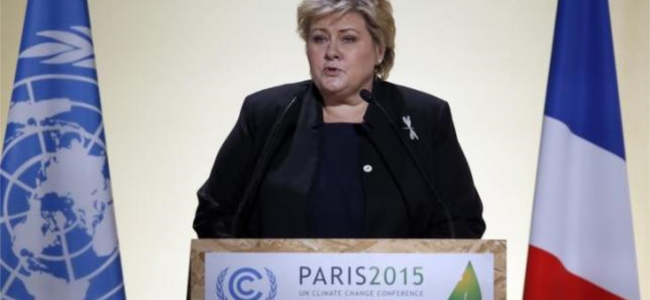
Norway already pledged $258 million to the Fund last year as part of the initial resource mobilisation and has now promised to double that figure by 2020, provided that GCF can finance verified emissions reductions in deforestation and forest degradation.
Speaking at the Paris global climate summit, Prime Minister Solberg stressed the importance of climate finance and Norway’s support for the Fund.
“The Green Climate Fund is now ready for business. I am pleased to announce today that Norway will significantly increase its contributions. If the Fund secures verified emission reductions from deforestation and forest degradation in developing countries, we will double our contribution by 2020,” she stated.
Børge Brende, the Foreign Minister of Norway, also reinforced his country’s support for GCF.
He emphasised the role of the Fund in adaptation projects, stating, “The Green Climate Fund will reduce developing countries’ vulnerability to climate change. Investments in adaptation to climate change are investments in development.”
GCF opened its initial resource mobilisation in October 2014, rapidly reaching $10 billion equivalent by the end of the year.
The Fund remains open for contributions during its initial resource mobilisation period and accepts them on an ongoing basis.

